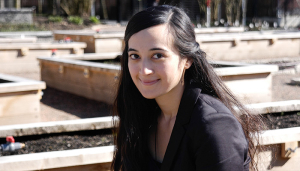Karen Castro-Ayala ’14 is the first Scripps College student to receive a $10,000 Napier Initiative Award, which is given each year to up to four graduating Claremont College students who have demonstrated leadership in social justice, peace, and environmental sustainability.

With the Napier award, Castro-Ayala plans to tackle issues of food and environmental justice by developing a community garden and a summer day camp for middle and high school students in her home state of Washington. Castro-Ayala was also recently awarded a $10,000 Davis Projects for Peace grant.
“I am working with a church that is deeply embedded in the Pasco community in eastern Washington to develop a community garden and summer day camp called, ‘Roots of Change,'” says Castro-Ayala, who grew up in Seattle, Wash. and often visited the city of Pasco as a child with her family.
Castro-Ayala’s academic-enrichment day camp will include sessions on gardening, cooking, food-justice discussions, environmental justice workshops and art and music projects. She is concerned with Pasco’s high levels of poverty, food insecurity, and low high school graduation rates.
“I have learned so much during my time at Scripps,” says Castro-Ayala, who is graduating in May with a dual major in politics and international relations and legal studies. “The most important principle I am taking with me is the fact that I will be using every single kind of privilege I have to see transformative structural change take place in my community.
“Being able to develop and establish ‘Roots of Change’ alongside community members with the financial support of the Napier award is one way I will continue, post-college, to use my privileges for transformative change.”
Professor of International Political Economy Nancy Neiman Auerbach advised Castro-Ayala on her project and encouraged her to apply for a Napier, since Castro-Ayala is one of her students in her Political Economy of Food class. The course prepared Castro-Ayala to think critically about food and environmental justice issues as she designed her own educational food justice program.
“Karen’s project has the potential to be transformative for the young people she will be engaging, for the community, and for Karen herself. She is hoping to use the community garden in Pasco not only to provide community members with access to land and a support system in order to grow their own healthy food, she is focused on youth education and community building as well,” Auerbach says. “The hope is that the garden becomes a focal point for people to gather and learn from each other.”
The Napier Initiative is a partnership between The Claremont Colleges and a nearby senior residential community called Pilgrim Place. Each year, the Napier awards $10,000 to up to four graduating seniors from The Claremont Colleges who have demonstrated leadership in social justice, peace, and environmental sustainability. Napier Fellows must propose a project they plan to carry out the first year after graduation.
“As a working-class woman of color, I am excited to work alongside my community in eastern Washington to develop a summer program and community garden,” Castro-Ayala says. “Our struggle for a more just world is a collective one and I say this because I wouldn’t be here without the unconditional support of my family, friends, mentors, and professors.”

